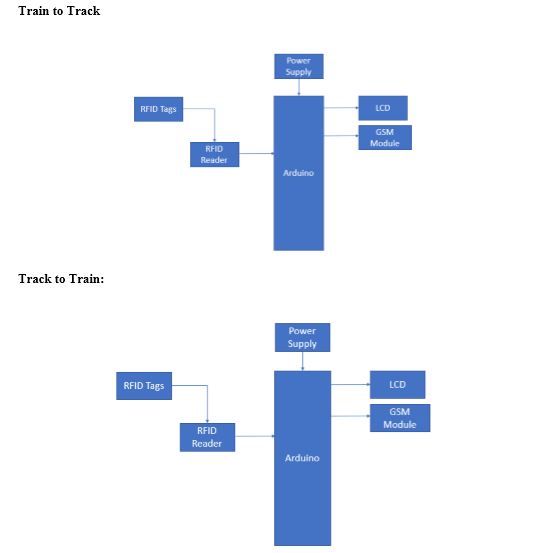AI Based Rush Collision Prevention in Railways
Objective
The main objective of this project is to prevent Collision in Railways by using RFID Reader
Abstract
Railways are the convenient, reasonable and popular node of transport in almost all major cities of not only in India but also all over the World. Railways are the most widely used and comfortable nodes of transportation system. Now a days in India most of the train accidents are occurs due to the human errors. It is very difficult to avoid to such train accidents because of the speed of train is very high and it requires some time to control it. In this project the effective solution is present to avoid the train accidents by using Radio Frequency Identification (RFID). The primary goal of proposed system is to identify possible train collision ahead of time and automatically changes the track before collision happens. This project proposes the avoidance of collision by knowing the status trains by using RFID technology.
Keywords: Arduino, RFID Reader, GSM, Railway Track
NOTE: Without the concern of our team, please don't submit to the college. This Abstract varies based on student requirements.
Block Diagram

Specifications
Hardware Requirements:
- Arduino
- RFID Reader
- GSM
- RFID cards
- Lcd-2
- Power supply
- adapter
- buzzer
- red led
Software Requirements:
- Arduino IDE
- Embedded C
- Fritzing
Learning Outcomes
- Arduino pin diagram and architecture
- How to install Arduino IDE software
- Setting up and installation procedure for Arduino
- Introduction to Arduino IDE
- Basic coding in Arduino IDE
- What is UART and I2C protocol and its working?
- Working of APDS-9960 gesture sensor
- Interface APDS-9960 gesture sensor with Arduino
- Working of Relay
- Interface relay with Arduino
- Working of Bluetooth
- Interface Bluetooth with Arduino
- Working of power supply
- About Project Development Life Cycle:
- Planning and Requirement Gathering( software’s, Tools, Hardware components, etc.,)
- Schematic preparation
- Code development and debugging
- Hardware development and debugging
- Development of the Project and Output testing
- Practical exposure to:
- Hardware and software tools.
- Solution providing for real time problems.
- Working with team/ individual.
- Work on Creative ideas.
- Project development Skills
- Problem analyzing skills
- Problem solving skills
- Creativity and imaginary skills
- Programming skills
- Deployment
- Testing skills
- Debugging skills
- Project presentation skills
- Thesis writing skills





 Paper Publishing
Paper Publishing
